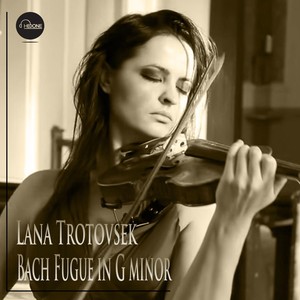
Violin Sonata in G Minor, BWV 1001: II. Fugue
- 演奏: Lana Trotovšek (小提琴)
- 发行时间:2014-11-05
- 类型:Single
- 歌曲
- 时长
-
作曲家:Johann Sebastian Bach
-
作品集:Violin Sonata in G Minor, BWV 1001
简介
Bach started composing Sonatas and Partitas for solo violin around 1703, while at Weimar, and the set was completed by 1720, when Bach was a Kapellmeister in Köthen. He was inspired by Johann Paul von Westhoff's partitas for solo violin, since he worked alongside the composer at Weimar, and his pieces share some stylistic similarities with Bach's. Solo violin repertoire was actively growing at the time: Heinrich Ignaz Franz Biber's celebrated solo passacaglia appeared c.1676, Westhoff's collections of solo violin music were published in 1682 and 1696, Johann Joseph Vilsmayr's Artificiosus Concentus pro Camera in 1715, and finally, Johann Georg Pisendel's solo violin sonata was composed around 1716. The tradition of writing for solo violin did not die after Bach, either; Georg Philipp Telemann published 12 Fantasias for solo violin in 1735. The tradition of polyphonic violin writing was already well-developed in Germany, particularly by Biber, Johann Heinrich Schmelzer, and the composers of the so-called Dresden school – Johann Jakob Walther and Westhoff. Bach's Weimar and Köthen periods were particularly suitable times for composition of secular music, for he worked as a court musician. Bach's cello and orchestral suites date from the Köthen period, as well as the famous Brandenburg concertos and many other well-known collections of instrumental music. It is not known whether Bach's works were performed during his lifetime or, if they were, who the performer was. Johann Georg Pisendel and Jean-Baptiste Volumier, both talented violinists in the Dresden court, have been suggested as possible performers, as was Joseph Spiess, leader of the orchestra in Köthen. Friedrich Wilhelm Rust, who would later become part of the Bach family circle in Leipzig, also became a likely candidate. Bach himself also possibly gave the first performance. According to his son Carl Philipp Emanuel Bach, "in his youth, and until the approach of old age, he played the violin cleanly and powerfully".







